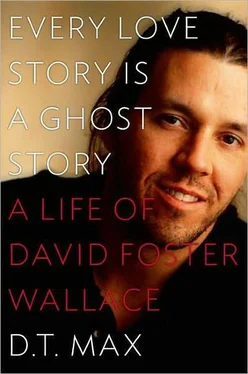But in his heart he was stunned with what had happened to him. “I am,” he wrote Dale Peterson, “OK, though very humiliated and confused.” He was sharing a barracks-like room in Granada House with four men, one of whom, he wrote Rich C., had had a stroke while on cocaine and had a withered right side. “Mr. Howard,” he told his Norton editor, “everyone here has a tattoo or a criminal record or both!” To Peterson he reported, “Most of the guys in the house are inmates on release, and while they’re basically decent folk it’s just not a crowd I’m much at home with — heavy metal music, black t-shirts & Harleys, vivid tattoos, discussion of hard- vs. soft-time, parole boards, gunshot wounds and Walpole—” Massachusett’s toughest prison. Wallace continued at his security job for more than two months, and then, unable to bear getting up so early, he quit. He went to work as a front desk attendant at the Mount Auburn Club, a health club in Watertown. His job was to check members in — he called himself a glorified towel boy — but one day Michael Ryan, a poet who had received a Whiting Award alongside him two years before, came to exercise. Wallace dove below the reception desk and quit that day.
Wallace’s friends were accustomed to his exaggerations and inventions over the years — they came with his clownish, hyperbolic persona — but when they visited him at the halfway house, they found that what he said was true: he had stepped through the looking glass. His friend Debra Spark, a fiction writer, remembers sitting in on a group therapy session with Wallace one day and being amazed to hear someone recount killing someone while drunk. All the same, Wallace found his place; order, no matter how foreign the context, was always easier for him than the unstructured world. He met with a counselor, as required, and nearly every evening he drove to different parts of the city with other Granada House members for substance abuse meetings. His sponsor was named Jimmy, “a motorhead from the South Shore,” as he called him to David Markson, with whom he had begun a correspondence. Wallace read the Big Book and enjoyed making fun of its cheesy 1930s adman vocabulary to his friends: “tosspot,” “Dave Sheen heels,” “boiled as an owl.” “He laughed at them, but he also knew he needed them or he would die,” Mark Costello, who visited him at Granada House, remembers.
If Wallace found himself in unfamiliar territory, the residents didn’t know what to make of him either. One remembers wondering, “This guy can go probably go to Betty Ford. Why’s he here with us welfare babies?” No one really cared for his cleverness. He was to them a type they’d seen before, someone who, like the character Geoffrey Day in Infinite Jest , tries to “erect Denial-type fortifications with some kind of intellectualish showing-off.” Wallace was back in high school, trying to figure out his place in the pack. “It’s a rough crowd,” he wrote his old Arizona sponsor, “and sometimes I’m scared or feel superior or both.”
Yet a piece of him was beginning to adjust to the new situation. He remembered his last failed attempt to get sober and how he was no longer writing and asked himself what he had to lose. He came to understand that the key this time was modesty. “My best thinking got me here” was a recovery adage that hit home, or, as he translated it in Infinite Jest , “logical validity is not a guarantee of truth.” He knew it was imperative to abandon the sense of himself as the smartest person in the room, a person too smart to be like one of the people in the room, because he was one of the people in the room. “I try hard to listen and do what [they say],” he wrote Rich C., “I’m trying to do it easy…this time,” not “get an A+.…I just don’t have enough gas right now to do anything fast or well. I’m trying to accept this.”
Not that things came easily. The simple aphorisms of the program seemed ridiculous to him. And if he objected to them, someone inevitably told him to do what was in front of him to do, driving him even crazier. The logical tautology behind recovery bothered him too: that recovery defined an alcoholic as anyone who drank heavily and denied he was an alcoholic, which made believing you weren’t an alcoholic a symptom of the disease, whether you were or not. He was astonished to find people talking about “a higher power” without any evidence beyond their wish that there were one. They got down on their knees and said the Thankfulness prayer. Wallace tried once at Granada House, he told Costello, but it felt hypocritical. 3
There were many times when he was sure he would start drinking again. “I’m scared,” he wrote Rich C. “I still don’t know what’s going to happen.” He asked his friend for some words of encouragement, and just when he thought he would give up, a letter arrived in which his former sponsor recounted the last time he had been in detox. “They gave me Librium,” he wrote Wallace, “and I threw them over my left shoulder for luck, and I’ve had good luck ever since.” The image, Wallace told his sponsor years later, was just the “good MFA-caliber trope” he’d needed.
Required to do chores in the house, Wallace helped out in the office. This gave him access to a typewriter. Stunned as he was, he understood from the beginning that his fall from grace was a literary opportunity. He had been hypothesizing beforehand about a nation in thrall to its appetites, and here he was living among its casualties. So in the midst of his misery, he was alive to the new information he was getting. The communal house, he would later write, “reeks of passing time. It is the humidity of early sobriety, hanging and palpable.” Wallace was known for sitting quietly, listening as residents talked for hours about their lives and their addictions. (Later, residents would often be surprised to find that though he had heard their stories they had not heard his.) The explanations people gave for their behavior startled him with their simplicity, but their voices — always his way in to composition — were unforgettable, and their stories had a clarity his lacked. This was the sort of access to interior lives a novelist could not get elsewhere. He was finding, as he later told an interviewer, that “nobody is as gregarious as someone who has recently stopped using drugs.” Where else could a writer find, as Wallace wrote in Infinite Jest , in a passage that sounds as if Lester Bangs had written it,
twenty-one other newly detoxed housebreakers, hoods, whores, fired execs, Avon ladies, subway musicians, beer-bloated construction workers, vagrants, indignant car salesmen, bulimic trauma-mamas, bunko artists, mincing pillow-biters, North End hard guys, pimply kids with electric nose-rings, denial-ridden housewives and etc., all jonesing and head-gaming and mokus and grieving and basically whacked out and producing nonstopping output 24-7-365. 4
Wallace and his notebook were a familiar sight in the communal rooms and recovery meetings, trapping little inspirations before they could get away.
Within a few months of arriving, Wallace had already drafted a scene centered on one of the most intriguing residents at Granada House, Big Craig. Big Craig — Don Gately in the novel — was one of the Granada House supervisors and sometimes the house cook. He had first met Wallace when he found the new resident’s stuff on his bunk and threw Wallace’s bag on the ground. Craig was in his mid-twenties, “sober and just huge,” as Wallace would later write in Infinite Jest , looking “less built than poured, the smooth immovability of an Easter Island statue.” Wallace quickly chose a different bed. Craig had grown up on the North Shore and been a burglar and Demerol addict. Friends closed elevator doors on his head for fun when he was a teenager, a detail Wallace would put into Infinite Jest too. 5
Читать дальше












